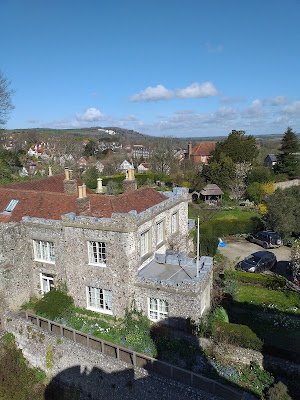The narrative is punctuated by folk stories, from the tale of Khair-ed-Din, known as Barbarossa, to the legend of the portrait of the Blonde Queen, and the story of a folk singer,
Photos and photography are a running theme, usually presaging disaster. Immediately after Idris has had his photo taken, his best friend is killed in an accident. The only photo in the oasis is that of his Uncle and two friends from the army ... taken the night before they were killed. Old Lala wants to adopt Idris because he resembles a photograph of her son, who died. Idris has a photo taken for his passport ... but it is of another man, with a beard. In Paris he goes to what he thinks is a bookshop and sees lots of porno magazines with images of naked men and women. When he finds the woman who took his photo there is a scene in a bar and he is arrested ... having his mugshot taken. A collector of (male child) shop mannequins takes photographs of the parties he holds with them. Even when he earns money as an extra in a film and forms a friendship with the director, going to his flat to look through an album of photographs, Idris is subsequently mugged by the pimp of the boys who normally go with the director.
If it isn't photos, it is the making of images:
- Khair-ed-Din's portrait painter says "I am a painter of the depths, and the depths of a human being are transparent on his face once the agitation of day-to-day life ceases." (p 36).
- Idris sees his first TV on the ferry to Marseilles: it shows adverts and the news of a riot in Paris.
- Another job he gets is to have a plaster cast made of his body to be turned into display mannequins.
- Idris learns calligraphy
And there is the theme of the golden droplet, a jewel found by Idris before he leaves the oasis and lost by him when he loses his virginity to a whore in Marseilles at the midpoint of the book.
Selected quotes:
Page numbers are from the Barbara Wright translation published by Methuen in paperback form in 1988
- "These men had become impalpable, colourless, odourless and insipid, because they had been reduced to figures, to signs, to abstract shapes." (p 71)
- "A defence against the maleficent power of the image, which seduces the eye, might be found in the acoustic sign, which alerts the ear." (p 171)
- "And there, poor among the poor, he did what the poor have an inexhaustible vocation for, he waited, motionless and patient." (p 79)
- "If what you have to say is not more beautiful than silence, Then keep quiet!" (p 177)
- "There is more truth in the ink of scholars than in the blood of martyrs." (p 177)
- "The faculty given to the calligrapher to lengthen certain letters horizontally introduces silence into the line, zones of calm and repose, which are the desert itself." (p 178)
- "The hand must be a ballerina and dance lightly over the parchment, not weigh down on it like a farm labourer with his plough." (p 179)
- "The sculptor's chisel; liberates the girl, the athlete or the horse from the block of marble. In the same way, signs are all prisoners of the ink and the inkwell. The reed pen liberates them, and releases them on the page. Calligraphy is liberation." (p 179)
- "The image is always retrospective. It is a mirror turned towards the past." (p 178)
- "The image is endowed with the power to paralyse, as for instance the head of Medusa, which turned to stone all those who came within its gaze." (p 185)
A short little book, delightfully written and full of incident. Idris ia a great Everyman. There are some very strange and very funny moments. Above all, it is thoughtful and challenges the reader to think. I'm not sure I understand it fully; I will probably need three or four more reads to get much from it. But it is beautifully constructed and works even if only on the level of a good story, well told.
'Moni Boni', another reviewer on goodreads, points out that the Idris finds only "visual fictions of himself" and that the book critiques the "Western world's cultural obsession with images."
September 2023; 198 pages














